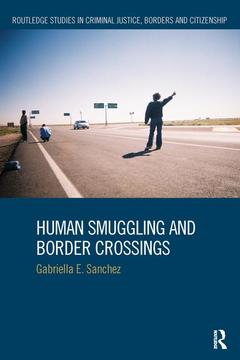Description
Human Smuggling and Border Crossings
Routledge Studies in Criminal Justice, Borders and Citizenship Series
Author: Sanchez Gabriella
Language: English
Subjects for Human Smuggling and Border Crossings:
Keywords
Transnational Migration; Crimmigration; Human Trafficking; Arizona/Sonora border; Border Crime; Transnational Crime; Human Smuggling; Maricopa County; Young Men; Smuggling Market; Agua Prieta; MCSO; Phoenix Police Department; Irregular Migrants; Human Smuggling Operations; Border Control Initiative; Smuggling Operations; Smuggling Fees; Smuggling Services; Irregular Border Crossers; Irregular Migration; Smuggling Organizations; Swat; Border Crossing; Safe House; Smuggling Groups; Mexican Origin; Van Liempt; Undocumented Immigrants; Smuggling Violence; Male Facilitators
Publication date: 10-2016
· 15.6x23.4 cm · Paperback
Publication date: 11-2014
· 15.6x23.4 cm · Hardback
Description
/li>Contents
/li>Readership
/li>Biography
/li>
Graphic narratives of tragedies involving the journeys of irregular migrants trying to reach destinations in the global north are common in the media and are blamed almost invariably on human smuggling facilitators, described as rapacious members of highly structured underground transnational criminal organizations, who take advantage of migrants and prey upon their vulnerability.
This book contributes to the current scholarship on migration by providing a window into the lives and experiences of those behind the facilitation of irregular border crossing journeys. Based on fieldwork conducted among coyotes in Arizona - the main point of entry for irregular migrants in the United States by the turn of the 21st Century - this project goes beyond traditional narratives of victimization and financial exploitation and asks: who are the men and women behind the journeys of irregular migrants worldwide? How and why do they enter the human smuggling market? How are they organized? How do they understand their roles in transnational migration? How do they explain the violence and victimization so many migrants face while in transit?
This book is suitable for students and academics involved in the study of migration, border enforcement and migrant and refugee criminalization.
Introduction: Among Coyotes 1. On Borders, Smugglers and the Imagination 2. Coyotes in the era of enforcement: Arizona’s human smuggling market and the criminalization of migration 3. "Together as a family": the nature and structure of smuggling 4. "I am not a pollero": facilitators’ reflections on smuggling 5. Gendering smuggling: women and the facilitation of extralegal border crossings 6. Conceptualizing violence in smuggling Conclusions.
Gabriella E. Sanchez is an anthropologist by training and a graduate of Arizona State University’s Justice and Social Inquiry Program. Her research interests include borders, migration and transnational crime and labor. She has conducted fieldwork along the US–Mexico border, Mexico, Central America, North Africa, the Middle East and Australia, documenting the experiences of the men and women involved in drug and human smuggling operations as traffickers/smugglers. A Boren and a Fulbright fellow, Gabriella was also a post-doctoral researcher at the University of Maryland’s Consortium for the Study of Terrorism and Responses to Terrorism (START) and a visiting lecturer on Feminism and Transnational Migration at Wellesley College. Gabriella is currently Assistant Professor at The Catholic University of America in Washington, DC and a Research Fellow at Monash University in Melbourne, Australia.




